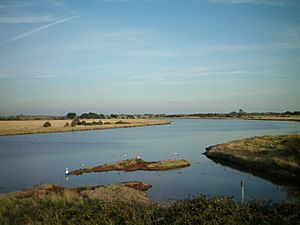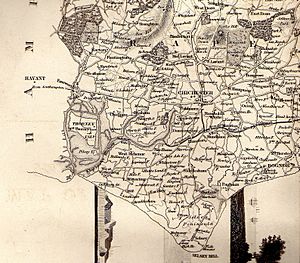Thorney Island (West Sussex) facts for kids
Thorney Island is a piece of land that sticks out into Chichester Harbour in West Sussex, England. It's almost an island, but it's connected to the mainland by a very thin strip of land. A narrow waterway called the Great Deep separates it from the rest of the land.
Contents
Exploring Thorney Island's Geography
The small village of West Thorney is located on the east side of the island. This village is now part of a British Army military base. The base covers the southern part of the island, south of the Great Deep.
You can walk all the way around the island on a public path. This path is part of the Sussex Border Path. However, if you want to go to the southern part of the island, you can only use this path and visit the church of St Nicholas in West Thorney.
When you use the footpath, security gates might ask you for your name, address, and phone number. This is for safety reasons. Always stay on the path marked with yellow posts. During the winter, people sometimes hunt partridge, pheasant, and snipe on Thorney Island.
Just south of Thorney Island is Pilsey Island. It's now connected to Thorney Island by a sandbank. Pilsey Island is a special place for birds, managed by the RSPB. In 2001, about 1,079 people lived on Thorney Island.
Understanding Thorney Island's Climate
The weather on Thorney Island is usually milder than in other parts of the UK. However, it can be a bit cooler than nearby areas because it's quite rural. The hottest temperature ever recorded was 35.2 °C (95 °F) on August 6, 2003. The coldest temperature was −9.3 °C (15 °F) on January 13, 1987.
The Met Office, which is the UK's weather service, has a weather station at Baker Barracks. This is the Royal Artillery base on Thorney Island.
| Climate data for Thorney Island 1981–2010 | |||||||||||||
|---|---|---|---|---|---|---|---|---|---|---|---|---|---|
| Month | Jan | Feb | Mar | Apr | May | Jun | Jul | Aug | Sep | Oct | Nov | Dec | Year |
| Mean daily maximum °C (°F) | 8.0 (46.4) |
8.2 (46.8) |
10.7 (51.3) |
13.2 (55.8) |
16.6 (61.9) |
19.5 (67.1) |
21.7 (71.1) |
21.7 (71.1) |
19.2 (66.6) |
15.4 (59.7) |
11.4 (52.5) |
8.7 (47.7) |
14.5 (58.2) |
| Mean daily minimum °C (°F) | 2.5 (36.5) |
2.1 (35.8) |
3.9 (39.0) |
5.3 (41.5) |
8.5 (47.3) |
11.3 (52.3) |
13.5 (56.3) |
13.4 (56.1) |
11.2 (52.2) |
8.6 (47.5) |
5.1 (41.2) |
3.0 (37.4) |
7.4 (45.3) |
| Average precipitation mm (inches) | 75.5 (2.97) |
51.2 (2.02) |
57.0 (2.24) |
47.7 (1.88) |
44.4 (1.75) |
44.2 (1.74) |
44.7 (1.76) |
49.4 (1.94) |
60.5 (2.38) |
86.6 (3.41) |
81.6 (3.21) |
83.4 (3.28) |
726.2 (28.58) |
| Average rainy days | 11.1 | 9.3 | 9.7 | 9.1 | 8.5 | 7.5 | 7.3 | 7.7 | 8.3 | 11.5 | 11.4 | 11.7 | 113.1 |
| Mean monthly sunshine hours | 68.9 | 88.9 | 128.5 | 191.6 | 221.5 | 218.7 | 232.0 | 220.0 | 159.2 | 120.0 | 81.2 | 61.7 | 1,792.2 |
| Source: Met Office | |||||||||||||
History of the Military Base
In 1938, an airfield for the Royal Air Force (RAF) was built on Thorney Island. Later, the Royal Navy also became interested in using the base.
In 1980, Thorney Island became a temporary home for many hundreds of families from Vietnam. These families were welcomed to settle in the United Kingdom. In 1985, scientists used the island for experiments. They studied how heavy gases spread in the air.
In 1984, the base was renamed Baker Barracks. It became home to a Royal Artillery unit called the 26th Field Regiment Royal Artillery. They used large guns called FH70s. Later, the 47th Regiment Royal Artillery took their place. This unit used Starstreak HVM missiles.
In January 2008, the 12th Regiment Royal Artillery moved to the island after returning from Germany. The 47th Regiment then moved to another location as part of a plan to reorganize the British Army.
In 2009, the airfield was used for a special test. A British-built steam car tried to break a very old land speed record there. The team included a test driver named Don Wales. He is the nephew of Donald Campbell and the grandson of Sir Malcolm Campbell, both famous for speed records.
See also
 In Spanish: Thorney Island (Sussex Occidental) para niños
In Spanish: Thorney Island (Sussex Occidental) para niños
 | Jessica Watkins |
 | Robert Henry Lawrence Jr. |
 | Mae Jemison |
 | Sian Proctor |
 | Guion Bluford |



